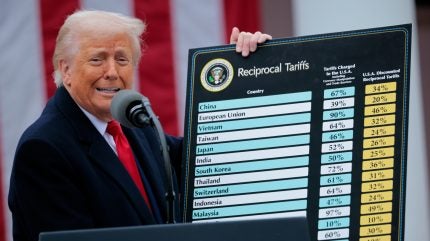
There is nowhere to hide from the direct effects of the ‘Trump tariffs’ on costs and their indirect effects via the wider economy, according to a new report.
The third edition of GlobalData’s Tariffs and Trade Wars Executive Briefing suggests that, while even a short-lived trade war reescalation between the US and any trading partners would avoid severe shocks for the global economy, “the underlying drivers of de-globalisation are inexorable.”

Discover B2B Marketing That Performs
Combine business intelligence and editorial excellence to reach engaged professionals across 36 leading media platforms.
The briefing, written shortly before the announcement that the US economy contracted 0.3% in the first quarter of 2025, asserts that the big question for the coming weeks is what happens at the end of the current negotiating pauses, which were due to end tomorrow (July 9), or in August in the case of China. It was announced yesterday (July 7), though, that the deadline has been pushed back for most countries, allowing more time for negotiation but prolonging the uncertainty.
A flurry of deals in the event of a deadline finally passing, the briefing suggests, would support the relatively benign current economic outlook – with the US’ deal with Vietnam pointed to as a welcome sign. No deals, however, could lead to a more volatile period of reescalation between the US and its trading partners.
“Given tight timelines – even if extended in some cases to September 1st, as recently mooted – any deals would be of an interim (‘Phase 1’) nature along the lines of the UK deal agreed in May 2025 and as suggested also by the China (Geneva détente/London framework) and Vietnam agreements,” the report says.
“We expect that several such deals will be landed. In the event of an impasse with major US trading partners, resulting re-escalation would likely be short-lived if tempestuous given the high costs for all sides. The EU is a candidate for such a flare-up; Trump’s recent targeting of Japan is another case in point.”

US Tariffs are shifting - will you react or anticipate?
Don’t let policy changes catch you off guard. Stay proactive with real-time data and expert analysis.
By GlobalDataThe report also notes that the more hawkish tendencies of US President Trump where tariffs are concerned have been reigned in by the risk of recession and associated financial market turmoil, which in turn could cause adverse domestic political reaction. It suggests that there is limited fiscal policy scope for an escalated trade war, with damaged international confidence hurting the US dollar and Treasury bond market and tariff-related inflation pressure discouraging Fed interest rate cuts.
“These factors account for Trump’s caution in stepping back from all-out trade war in Q2/25 in favour of 90-day negotiating pauses … Against the backdrop of these pauses, the US economy, based on the key indicator of payrolls (not contracting), is for now steering comfortably clear of recession,” the briefing says.
Navigate the shifting tariff landscape with real-time data and market-leading analysis. Request a free demo of GlobalData’s Strategic Intelligence here.





